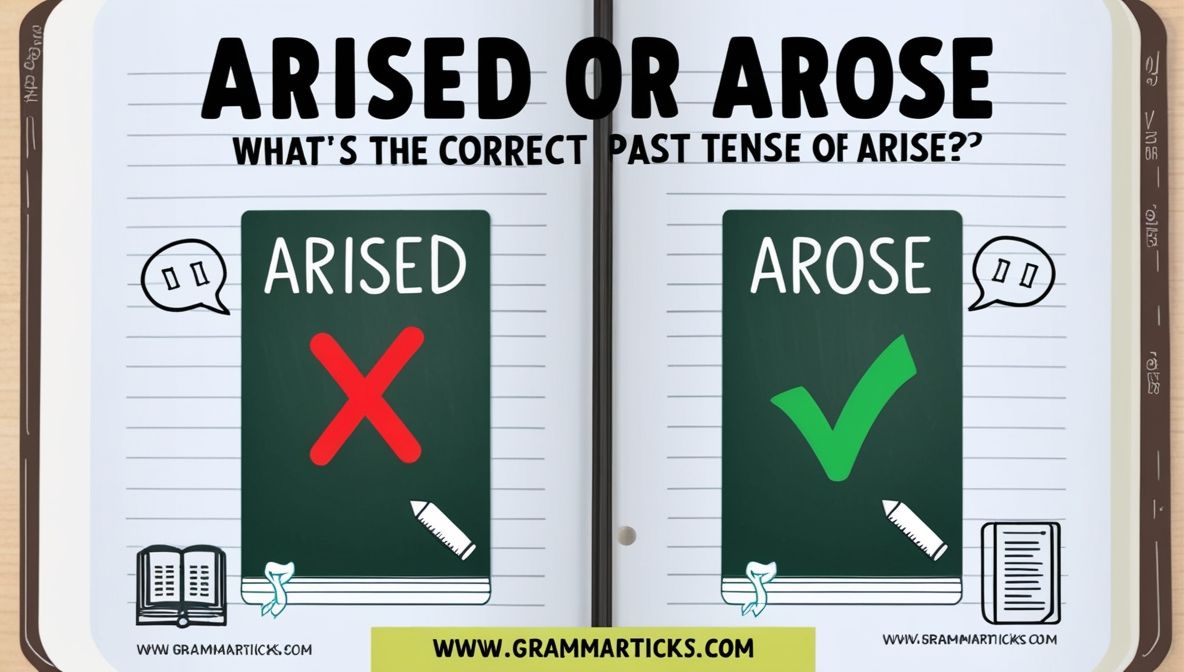Choosing the right verb form can be tricky, especially with irregular verbs. One commonly misunderstood pair is “Arised or Arose” a classic example of how English grammar can trip people up. If you’re unsure which is the correct past tense of arise, you’re not alone. This article will break it down with examples, comparisons, and simple tips.
Understanding whether to say “The issue arised” or “The issue arose” can make a big difference in writing and speaking. Getting these details right helps you avoid common English mistakes and communicate more clearly in both casual and professional settings. Let’s clear up the confusion once and for all.
Arise Meaning and Use
The arise definition includes meanings like “to emerge,” “to come into being,” or “to get up.” It’s an intransitive verb, so it doesn’t need a direct object.
Scenario Example
A problem may arise during a live presentation when the slides don’t load.
The Correct Past Tense of Arise

The past tense of arise is arose. This is a fixed form “arised” is never correct. Here’s how it works:
| Tense | Verb Form | Example |
|---|---|---|
| Present | arise | Conflicts arise in every relationship. |
| Past | arose | A disagreement arose during the meeting. |
| Past Participle | arisen | Tension has arisen over time. |
Tip to Remember
If you’re tempted to add “-ed,” stop and double-check. Arise is irregular and does not follow regular verb patterns.
Why “Arised” Is Wrong
“Arised” might sound logical, but it doesn’t exist in standard English. The confusion happens because most verbs form the past tense with “-ed.” But irregular verbs don’t.
Scenario Example
❌ A challenge arised during the call. ✅ A challenge arose during the call.
Pronunciation of Arise and Arose
| Word | Pronunciation (IPA) | Sounds Like |
|---|---|---|
| Arise | /əˈraɪz/ | uh-RIZE |
| Arose | /əˈroʊz/ | uh-ROZE |
Tip to Practice
Say the words aloud in real sentences. Repetition helps lock in the correct pronunciation and verb tense.
Examples of Arise and Arose in Sentences
| Tense | Sentence Example |
|---|---|
| Present | New issues often arise after an update. |
| Past | A strange sound arose from the basement last night. |
| Future | More opportunities will arise after the training ends. |
Arise vs. Rise – What’s the Difference?
| Verb | Usage Example | Object Needed? |
|---|---|---|
| Arise | Questions arise when instructions are unclear. | ❌ No |
| Rise | He rises from his seat every time she enters. | ❌ No |
Arise is more abstract, used for events or situations. Rise is usually physical.
Synonyms of Arise and Arose
| Tense | Synonyms |
|---|---|
| Arise | emerge, occur, develop, spring up |
| Arose | happened, surfaced, came up, unfolded |
Tip
Use synonyms to vary your writing and avoid repetition.
Arise Verb Conjugation
| Tense | Conjugation |
|---|---|
| Base Form | arise |
| Present Tense | arises |
| Past Tense | arose |
| Past Participle | arisen |
| Present Participle | arising |
Arise Etymology
Arise comes from Old English “ārīsan”, meaning “to get up” or “go upward.” The prefix “a-” means “up,” paired with “rise”—which shows its relation to movement or emergence.
Common English Mistakes with Arise
- Confusing arise with raise (which needs an object)
- Using arised instead of arose
- Using it transitively, which is incorrect
Tip
Remember: You can’t “arise something.” If you need a verb that takes an object, use raise.
FAQs
No, “arised” is grammatically incorrect. The right form is “arose.”
“Arise” is intransitive (no object), while “raise” is transitive (requires an object).
The past participle of arise is arisen.
Final Words
Now you know the correct past tense of arise is arose. The word “arised” is not correct and shouldn’t be used. It’s a common mistake, but now you can avoid it.
Remember, arise is an irregular verb, so it doesn’t follow the normal -ed rule. Use real examples to practice.
If you ever get confused again about “Arised or Arose”, just think back to this guide. Keep it simple, and trust what you’ve learned. You’ve got this.

